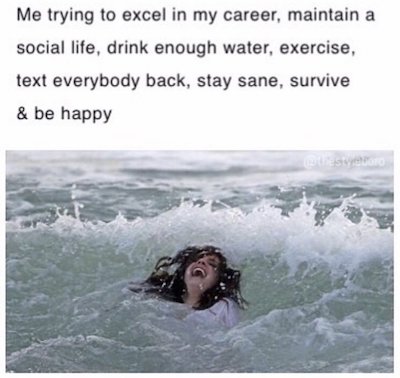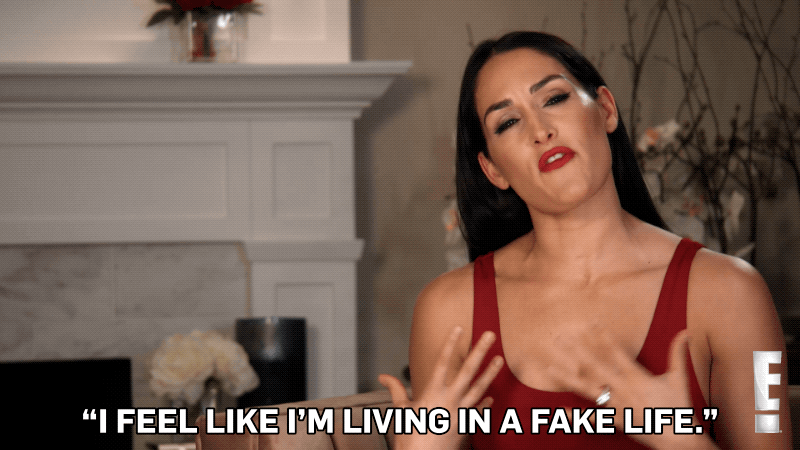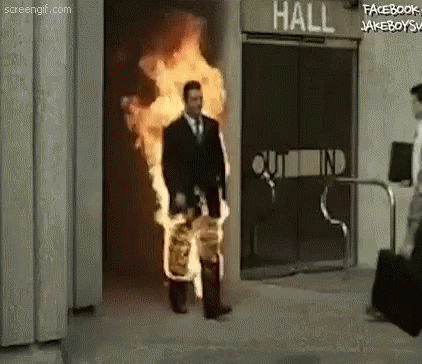Two weeks into January, I burnt out.
Does any of this sound familiar: being constantly close to tears, switching between moments of intense rage and paralyzing sadness, fighting extreme mental, emotional and physical exhaustion while attempting to suppress the consistent pressure in your chest that keeps balling up tighter, like a neutron star collapsing into its own gravity as you drown in the work and obligations you have.

Warning signals started going off when I noticed that any minor inconvenience felt like imminent disaster. Every curveball felt like a major crisis.
One morning, I remember opening the fridge door to make coffee only to discover we were out of almond milk.
The surge of panic that clawed its way to my throat was truly a visceral sense of horror. As if the insurgents bum-rushing the Capitol were charging straight for my kitchen, Confederate flags waving — threatening democracy and the energy levels I desperately needed to get through all the work I had to do.
I had to fight the urge not to yell with frustration and rage hurl the almond milk carton, molotov cocktail style, against the window.
Burnout, an Origin Story
Like most origin stories (and burnout, come to think of it), my burnout story started with emotional upheaval.
I’m no stranger to burnout. I’m sure most of us aren’t.
For those that have experienced it, it’s easy to recollect: that steady stream of anxiety, illogical emotional outbursts, feelings of incompetence and disillusionment, an overall sense of helplessness.
I felt all these feelings for the first time in my mid 20’s.
/__opt__aboutcom__coeus__resources__content_migration__treehugger__images__2019__05__burnout-5f0078fa9b8749b187679208ef35c4ae.jpg)
Amidst a hectic travel and work schedule, in my early to mid 20’s I had just moved from London to New York to navigate life in a new city, network, and job in finance. Prior to New York, I’ve moved every four years or so since middle school. So while transitions are always difficult, I don’t believe this is what ignited my first experience with burnout.
What triggered my first burnout — and what I’ve since surmised coincides with subsequent ones — is that during this transition my amazing, adorable, smart, kind, not-enough-adjectives-to-describe, baby sister started displaying erratic behavior during her first year at Wellesley.
It was not until a year later, when she had dropped out and chose to live on the street versus the comforts of home that we understood these were the nascent symptoms of manic-depressive disorder – that she had lost touch with the world around her, and what was real.
For over a year, my parents followed her up and down the West Coast, living day by day in motels, hotels, whatever lodging they could find to be by her side in case she needed them, even though more often than not she thought they were out to control and subdue her, as she fought to stay on the streets, away from safety.
And then she got pregnant. Homeless, vagrant, and pregnant.
It was our own twisted version of Carmen Sandiego: a surreal chase around the world to convince her, with her pregnant belly in tow, that her delusions were only in her mind.
To come home where she is safe, where she is loved.

She had fallen so off the deep end and surely convinced that her perspective of the world was real — that living on the street was the right choice for her and her baby — we didn’t know how to convince her otherwise.
I remember snooping in her closet at one point and uncovering notebooks filled with license plate numbers, expiration dates of meat, wait times between traffic lights changes.
All notes she had compiled to try and solve some secret global conspiracy that we did not understand.
It was a scene straight out of A Beautiful Mind, except instead of Russell Crowe, this was my innocent baby sister. The one who surfaced couch cushions down the stairs with me as a child.
I remember reading these and wiping away tears on a dress hanging from her closet.
Sorry, Mei. For ruining that dress and for snooping.
Leading a double life
Things would seem stable for a month or so and my parents would fly back to China to resume their lives for a few weeks only to be alerted that she suddenly needed help again and hop back on the next flight, no questions asked.
While my parents were constantly on the move, I was in this strange Hannah Montana situation: on weekdays I would be heads down at my desk in New York or meeting clients, climbing the corporate ladder.
I’d arrive early. Stay late.
Attend happy hours when I could. Go to the gym after.
Maybe socialize if time permitted.
Fridays often meant hopping on a plane to join my parents in their quest to convince my sister to come back home. Sunday nights meant a red-eye flight to arrive at 5 AM Monday morning, cab to the gym where I’d shower, get ready, hide my dark circles and puffy eyes under mountains of concealer, stow away my suitcase in the office closet, and quietly wait for the rest of the office to come in.
My coworkers used to compliment me on how I was often the first one in the office.
Little did they know why. Which is to be expected — I hardly told anyone during this time.

What is burnout?
Burnout affects us all in different ways and is a term that came to light relatively recently.
It was first coined in 1974 by Herbert Fredeunberger:
Burnout is a depletion or exhaustion of a person’s physical or mental resources attributed to his or her prolonged, yet unsuccessful striving toward unrealistic expectations, internally or externally derived.
Herbert Fredeunberger
Out of this definition, there are a few main components that relate to anyone experiencing burnout:
- It is caused by extreme and extensive stress.
- It comes with a feeling of hopelessness.
- There is a sense of helplessness, that you are not in control of the situation.
The biggest implication tied to burnout is the latter part of Fredeunberger’s definition, coined in his book Burnout: The High Cost of High Achievement: “the extinction of motivation or incentive, especially where one’s devotion to a cause or relationship fails to produce the desired results.”
Failure to produce results.
That was key.
Morale was definitely at rock bottom during this entire experience with my sister: it seemed hopeless to think things would ever change when she chose to be on the street rather than come back home.
We’d tried everything we could think of: therapy, friend interventions, medication, tough love.
Even institutional stewardship. This is the PR way of saying we brought her to a psych ward, which can be a whole separate piece of writing in and of itself.
This just didn’t seem like a problem any of us could solve.
I remember sitting in the car with my father during one visit and finding a pair of binoculars. I jokingly asked him if he had picked up bird-watching as a hobby to cope with stress.
I still remember my dad, eyes never leaving on the road, telling me: “No, these are for me to watch at a distance to see if she settled in a warm place to sleep for the night. She won’t let me near her, this is the only way I can know she is safe — especially on nights when she doesn’t make it into a shelter.”
To this day, I remember the exact weight of those binoculars and the texture of that bezel — and can imagine my father, parked two blocks away with the binoculars pressed so hard, his glasses cutting into his nose, waiting to see if my sister made it in line at a homeless shelter, or found camp on the beach.
I’ve never felt such love and such sorrow for my father all in one precious moment.
There was no easy solution, or even a solution at all, it seemed like. It didn’t feel like the situation could ever improve.
My family and I were so committed to our goal of bringing my sister home, only to constantly be rebuffed. This wasn’t like a tennis match where the solution was easily understandable: you can improve your game by spending more time practicing.

Me: Nadal. Tennis racket: The situation
How do you convince someone that their reality is not real?
Dismissing my sister’s perspective felt unnecessarily cruel, yet acknowledging her interpretation only enabled her to continue putting herself and others at risk.
My 20’s something burnout emerged as constant breakdowns interspersed with a general sense of numbness, fueled by caffeine and a steady buzz of adrenaline from new plot twists almost every day. I woke up every morning in constant dread, afraid to check my phone for fear of new updates that happened while I was asleep.
For most of that period, I just felt inordinate amounts of uncontrollable rage or sadness. The emotions would rise up in my chest unexpectedly while in the office, forcing me to pretend my contact lense was bothering me so I could brush away tears behind my computer screen and rush to the nearest bathroom stall to unleash violent, shaking but silent sobs.
There didn’t seem to be hope that it would get better, and leading this lifestyle put me constantly on edge — I’m pretty sure I held my breath for over a year.

Everything’s fine, just fine
In hindsight,
As I continue to dedicate time to writing, it never ceases to surprise me how writing can be oddly therapeutic. I started this piece with the intention of writing more about burnout and preventative strategies to manage burnout.
It has since mutated into me helping me process my family dynamic and recognizing that my burn out cycles are closely tied to my family’s overall well-being.
If you are not aware, manic depressive disorders are cyclical; there are periods of calm and periods of storm. After my sister’s first episode, we’ve came to realize that this was a period of instability and uncertainty fueled by mania. But these are only short term epochs.
In reality, she is primarily still the same amazing, adorable, smart, kind, not-enough-adjectives-to-describe, baby sister I have. Fast forward to the present, tragedy begets blessings in disguise. During this experience, the arrival of the little bundle of joy that is my nephew was made all the more significant because of what he means to our family. His existence is what brought my sister back to us and gave her the clarity/strength to fight her demons.
However.
Periods of mania involve inordinate amounts of stress.
Feelings of helplessness continue to arise as we are powerless to help her make her own life choices. And there are periods of despair that things will ever get better, that this cycle will end. Every cycle continues to bring much pain and trauma to all members of the family.
More importantly, hindsight is 20/20 — it normally isn’t until a few months in that you begin to realize, in retrospect, that the stress and emotional upheaval I was experiencing related to an episode of mania.
Starting at the end of December this year, my sister began experiencing another bout of mania and it wasn’t until working through this article that I realized 1) this was another cyclical pattern of manic-depressive disorder, and 2) that I was feeling burnout because that feeling of loss of control was snowballing caused by this situation.
As I grow from my life experiences, I’ve come to learn that oftentimes, the hardest part is identifying the root problem.
In summary,
Just coming to terms and processing this has helped astronomically in managing the negative symptoms of burnout I was experiencing. I now feel as if a valve has released; the Pompeii level of pressure that was building up in my chest has subsided.
And more importantly, that sense of hopelessness and helplessness has decreased. It’s not gone away, not in the least. But it feels like a beast I can now wrestle to the ground and tame when I need to, instead of a Godzilla level adversary.
Now that I have diagnosed the problem, I look forward to working through my own healing and figure out how to move forward until this next cycle passes.
Thank you readers, for tuning into my active journaling session.
Wow. Thanks for sharing such a powerful and vulnerable story. I’m floored. What a vivid image of you showing up for work early, while people at your company complimented you! Meanwhile you had an entirely different reason for being early. This is beautiful.
LikeLike
So glad to hear it resonated with you, Ryan. Appreciate the support and the kind words.
LikeLike
wow! thanks for BEING the practice of the Culture Code! 😉 I admire your courage to share about your family – I can’t even begin to fathom what this is like for your dad & the incident w the binoculars is so vivid & happy to hear you tried to lighten him up by asking about birdwatching!
I also can’t imagine hitting burnout in your 20s – i thought 35 was early – you have me beat though I realize it’s all relative & not a competition lol :p
I am very curious if you’ve created zettels around Fredeunberger’s book to share? I have a constellation of books I’ve been framing around The 5 Essential Elements of Wellbeing & designing “games” around it that might be worth chatting about as long as it doesn’t distract us from Braiding Sweetgrass the next few weeks 🙂
So appreciate you being a fellow avid notetaker & listener (yeay!) – can’t wait to see the ways your writing shows up in our graph.
awesome to meet you on this front 🙂
LikeLike
To be burned out is to be used up, like a battery so depleted that it can’t be recharged. In people, unlike batteries, it is said to produce the defining symptoms of “burnout syndrome”: exhaustion, cynicism, and loss of efficacy. Around the world, three out of five workers say they’re burned out. A 2020 U.S. study put that figure at three in four. A recent book claims that burnout afflicts an entire generation. In “ Can’t Even: How Millennials Became the Burnout Generation ,” the former BuzzFeed News reporter Anne Helen Petersen figures herself as a “pile of embers.” The earth itself suffers from burnout. “Burned out people are going to continue burning up the planet,” Arianna Huffington warned this spring. Burnout is widely reported to have grown worse during the pandemic, according to splashy stories that have appeared on television and radio, up and down the Internet, and in most major newspapers and magazines, including
LikeLike
“The earth itself suffers from burnout.”
100%, beautifully and heartbreakingly said.
These are great quotes and information, thank you so much for sharing. This is such a top of mind conversation for me — I always feel like burnout looms around the corner. What has been your experience with burnout in the past? Do you have good strategies both to prevent and recover from it??
LikeLike